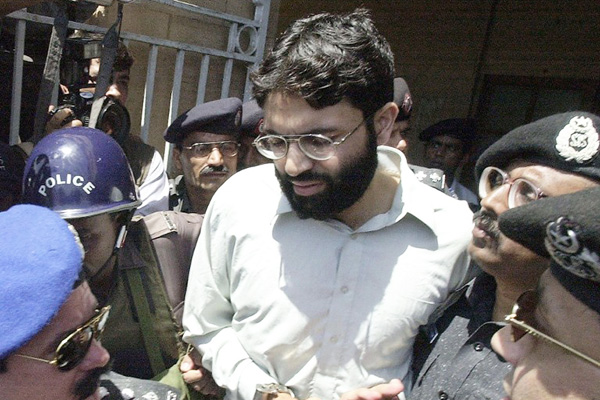
File photo. Aamir Qureshi—AFP
In detailed verdict on acquittal of primary suspect in murder of U.S. journalist Daniel Pearl, apex court says evidence provided was flawed
Issuing its detailed verdict on the acquittal of Omar Saeed Sheikh, the primary accused in the kidnap and murder of U.S. journalist Daniel Pearl, Pakistan’s Supreme Court on Friday maintained that the prosecution had failed to prove the charges against him.
On Jan. 28, the top court had rejected an appeal filed by the Sindh government against Sheikh’s acquittal by the Sindh High Court in the 2002 murder of Pearl, and ordered his immediate release. A three-member bench comprising Justices Mushir Alam, Yahya Afridi and Sardar Tariq Masood issued the verdict with a 2-1 majority in favor of Sheikh’s release, as well as his co-accused, Fahad Nasim Ahmed, Syed Salman Saqib, and Sheikh Mohammad Adil. Justice Yahya Afridi penned the dissenting note, noting that in cases of conspiracy, guilt could be established by circumstantial evidence in the absence of direct proof.
He said that Sheikh’s guilt could be established through “reasonable grounds,” adding that an email demanding ransom for Pearl’s release—from Jan. 30, 2002—made it clear the accused’s motive was to intimidate and provoke fear and insecurity. In this regard, he said, the reasoning behind Sheikh and his co-accused’s abduction of Pearl fell within the purview of “terrorism” under clause (b) of subsection (1) of Section 6 of the Anti-Terrorism Act, 1997.
Justice Afridi also regretted that Sheikh’s appeal had pended before the Sindh High Court for almost two decades, adding that it was failure of the state to not provide him his due right to be heard by an appellate court within a reasonable period of time.
Benefit of doubt
In the detailed majority judgment, authored by Justice Masood, the court stressed that doubts had been raised about all available evidence, and in such a situation the benefit of the doubt went in favor of the accused. It noted that any form of reasonable doubt regarding guilt of an accused granted a right to the accused to benefit from it without any reservation.
Therefore, read the verdict, the Sindh High Court had rightly granted the benefit of doubt to Fahad Nasim Ahmed, Syed Salman Saqib and Sheikh Mohammad Adil and acquitted them of all charges. Similarly, it said, the benefit of doubt had also been rightly extended to Omar Sheikh. However, it said, he had been wrongly convicted him under Section 362 of the Pakistan Penal Code due to flawed evidence. Even in high-profile cases such as this one, it added, benefit of doubt could not be extended to the prosecution.
The verdict stated that one witness was not even shown Pearl’s photo for identification prior to his testimony. Additionally, it questioned why the deceased journalist’s wife had waited 12 days before filing a complaint with police against his abduction. “The FIR does not mention threatening emails, nor was Pearl’s wife questioned,” it read.
Referring to the decapitation video, the apex court ruled that the accused could not be identified in it and the original clip was unavailable, preventing forensic analysis from being conducted.
The court ruled that the prosecution had failed to prove Sheikh’s murder of Pearl, adding the non-cooperation of the journalist’s family with authorities during investigations had resulted in a flawed probe. “It is the court’s job to highlight flaws in the investigation, not correct them,” it added.
Pearl, 38, was the South Asia bureau chief of The Wall Street Journal. Sheikh was charged with abducting him in Karachi in January 2002 and subsequently sending a graphic video showing his decapitation to the U.S. Consulate. Sheikh was then placed under arrest and sentenced to death by the trial court. The Sindh High Court ordered his acquittal last year, prompting the Sindh government to appeal against the verdict in the Supreme Court.
